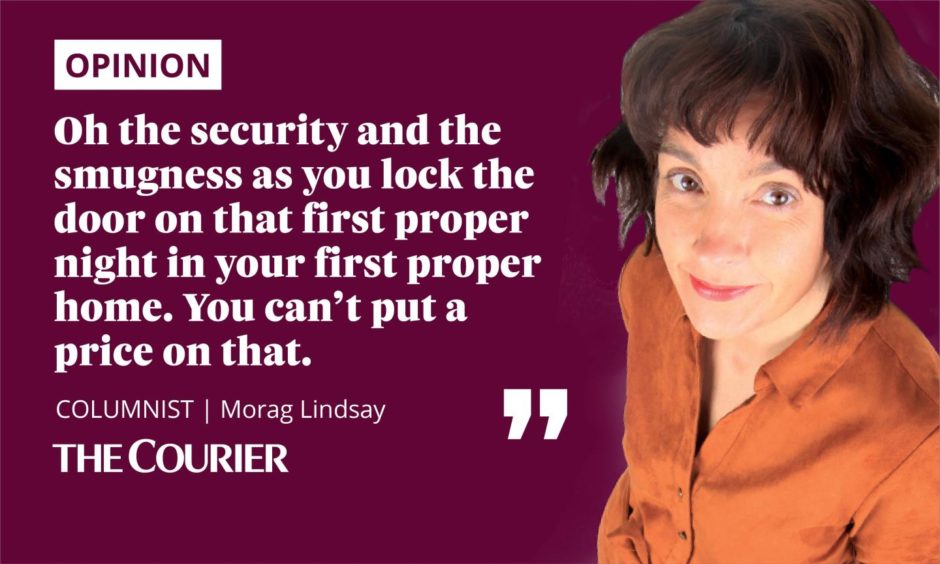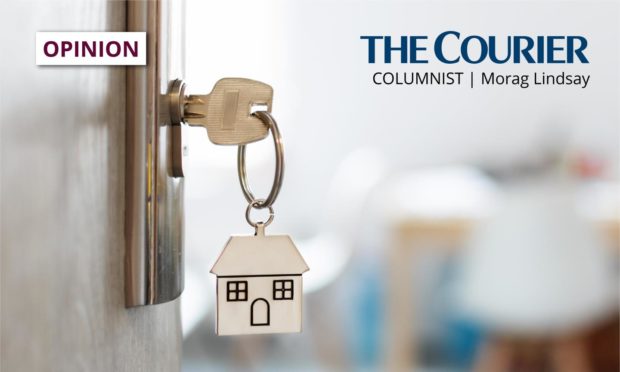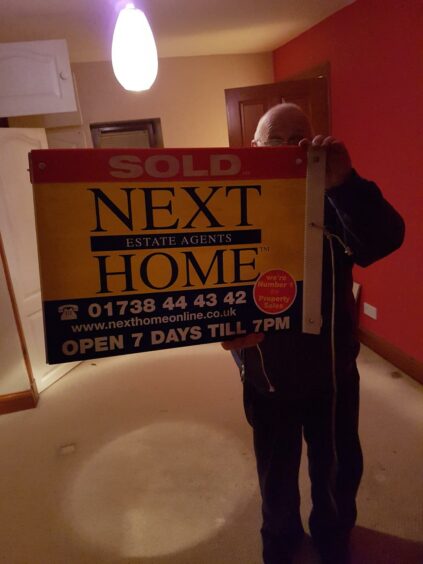I left it stupidly late to join the home ownership gang.
I’ve got excuses. They’re just not very good ones.
I lived alone in Aberdeenshire, where oil wages did terrible things to asking prices.
I rented a place in the countryside near the sea, which made me happy in a way no sensible starter flat in the city ever could.
Oh and I spent a lot on beer and CDs.
So now the pals who are tearing up their mortgages, cashing in the pensions they started at 17 and skipping off into early retirement are having the last laugh.
But I had fun while it lasted. And I will tell myself that when I’m still working till I drop to get Mr Halifax off my back.

See when I did get round to buying my own place though…
Oh the security and the smugness as you lock the door on that first proper night in your first proper home. You can’t put a price on that.
It’s tiny and it needs a good clean. But I can paint the walls any colour I want.
I’ve planted roses round the door and I happily hammer in nails where once there would have been blu-tack.
The hundreds of pounds that vanish from my bank account every month are going towards something I will one day own outright, and not into some landlord’s holiday fund.
And when I’m ancient my nephews can sell it out from under me to pay for my care home.
(Or wait until I croak and turf all the broken accordions and other crap I’ve bought off eBay into a skip, only to discover I’ve left it to some dog charity in my will.)
Sad stories of those stuck in rent
It’s my home. My place on this Earth. And I recommend it to anyone.
And I’m starting to see how lucky I was to be house-hunting in an era when the property ladder was within the reach of anyone with the sense to grab it.
Because it’s starting to look like home ownership is a privilege that’s going to be denied to more and more people in our area.
Our Impact team looked at the pressures facing first-time buyers for a special investigation called Stuck in Rent this week.
The pandemic inspired people to move to rural areas like The Highlands and Perthshire, pricing young people out of those markets
Young folk renting flats in Dundee see their costs continue to rise as they pay someone else's mortgagehttps://t.co/uKffbG1qIx
— Sean O'Neil (@s_oneil88) September 16, 2021
They found people living in insecure short-term lets and appalling conditions.
Full-time workers talked about the impossibility of saving for a deposit while paying sky high rents every month.
And estate agents described a property market that has hit the ground running and shown no sign of slowing since it re-opened after the pandemic.
Houses are selling the minute the For Sale signs go up, often for far in excess of the asking price.
The V&A effect is gentrifying properties in Dundee out of the affordable range and close to Aberdeen and Edinburgh levels.
It's our 3rd birthday! 🥳✨
We'd like to thank everyone who has visited and supported us, you're all amazing ♥️
Do you have memories of your visit you'd like to share? Pop them below, we'd love to see them ☺️ pic.twitter.com/5mKoBYD0RP
— V&A Dundee (@VADundee) September 15, 2021
Meanwhile, homes in rural areas, such as Perthshire and Angus, now look increasingly desirable to people freed from the daily commute to the office – and increasingly beyond the means of local families.
Airbnb impact takes its toll on Fife
The impact of Airbnb in areas like the East Neuk is another hot potato.
Councillors there will consider creating a “control area” when they meet next week in an effort to turn around the drought of affordable homes.
The move would require people to obtain planning permission before they can turn a house into a holiday let.
It comes after a house in Elie sold for £600,000 over the asking price last month.
It’s thought as many as 70% of homes in the village are now holiday accommodation.
All this is great news for people who already own property.
For the ones caught in the mismatch between supply and demand it’s another story.
Councils dealing with Thatcher’s legacy
So what’s to be done?
Elsewhere, councils are considering steps to compel owners to sell houses that have been empty for long periods of time.
Allowing developers to build more homes would help meet demand too – although that will require investment in schools and roads to save communities from being overwhelmed.
Another answer is boosting the supply of social housing so people can at least have affordable tenancies that allow them to save for a deposit on a place of their own.
Or stay where they are.
Margaret Thatcher’s right-to-buy policy in the 1980s gave many working class families that first step onto the housing ladder.
But it also contributed to many of the issues we see today.
Hundreds of thousands of tenants took advantage of hefty discounts to purchase their local authority homes.
And while a share of the cash went back to councils to build replacement properties the sums dwindled over time to the point we’re at today – never-ending waiting lists and ex-council houses inhabited by private tenants paying exorbitant rents with none of the security.
What’s so bad about renting anyway?
I wonder if it also created a stigma around renting.
If buying wasn’t the be all and end all and places had an adequate supply of social housing would dodgy landlords find it so easy to treat tenants like second class citizens?
There are plenty of countries below the UK on the European home ownership table.
France, Sweden and Denmark all have lower rates. Only around half of German households own their own home. In Switzerland it’s just 41%
It’s not that people there can’t afford to buy a house. These are countries with standards of living as good as and better than ours.
But they also have decent municipal housing and social safety nets which mean there isn’t that same pressure to own a property as a savings policy – the thing you sell to pay the nursing home bills.
Home ownership is brilliant. But paying a rent is nothing to be ashamed of and maybe we need to treat the people who do so – out of choice or circumstance – with a bit more respect.

